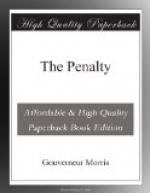“Barbara!”
“Yes, I did—I thought it strongly. Shows what a fool a girl who’s naturally foolish can make of herself! Why, father, what if he has suffered through your mistake? That mistake turned your thoughts to the new surgery—and for the one miserable man that you have hurt you will have given the wonder of hope to the whole of mankind.”
She slid her hand under her father’s arm.
“Let’s potter ’round the gardens,” she said, “and forget our troubles. It’s bully to have you back. There’s not much doing in the floral line. The summer sun in Westchester doesn’t vary from year to year. But there are lots of green things that smell good, and the asters and dahlias are making the most extraordinary promises of what they are going to do by and by.”
They passed out of the house and by marble steps into the first and most formal of their many gardens, and so down through the other gardens, terrace below terrace, to the lake.
The water was so still as to suggest a solid rather than a liquid; to the west shadowy mountains of cloud charged with thunder swelled toward the zenith. The long midsummer drought was coming to an end, and all birds and insects were silent, as if tired of complaining. Across the lake one maple, turned prematurely scarlet, brought out the soft greens of the woods with an astounding accent. Directly in front of this flaming tree, a snow-white heron stood motionless upon a gray rock.
[Illustration: They passed out of the house and by marble steps into the first and most formal of their many gardens]
To Barbara it seemed on that day that “Clovelly” was the loveliest place in all the world, and her father, who had fashioned it out of rough farm lands, one of the world’s most charming artists. “Why paint with oils, when you can draw with trees and flowers and grass and water?” she asked herself.
“In the time it took me to do Blizzard’s bust,” she said, “I could have planted millions of flowers and seen them bloom.”
“At least,” said her father, “you can finish a bust, but a garden that is finished isn’t a garden. What are you going to do with it?”
“The bust? Why, sometimes I think I’ll just leave it in the studio, and let it survive or perish. Sometimes I want to take a hammer and smash it to pieces.”
“It didn’t come out as well as you hoped?”
“Of course not. Does anything ever? But it’s the best that I can do. And I shall never do anything better.”
“Nonsense.”
“I shall never even try. I want to recover all the things I’ve thrown away, and put them back in my head and heart where they belong, and just live.”
“Well,” said her father, smiling, “if you feel that way, why that’s a good way to feel. But I’m afraid art is stronger in you than you think. Just now you’re tired and disillusionized. In a month you’ll be making sketches for some monumental opus.”




